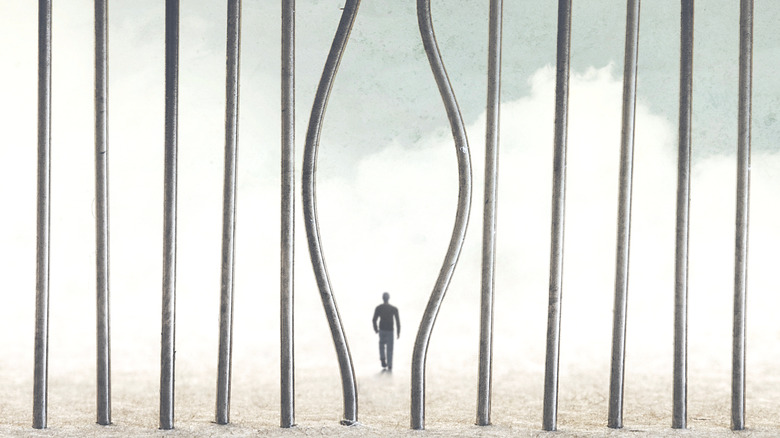Why It Is Legal To Attempt To Escape Prison In Germany And Some Other Countries?
Breaking out of U.S. prisons is illegal, as clearly spelled out in 18 U.S. Code chapter 35 section 751, which states that a person arrested on a felony charge or convicted of any charge could be fined or face up to five additional years in prison while a person arrested on a misdemeanor charge or for extradition, exclusion, or expulsion related to immigration law could be fined or face up to one additional year in prison. Hollywood has dramatized attempts to escape prison to great effect, usually focusing on those who have been convicted of a crime they say they didn't commit, with productions ranging from television's "Prison Break" to big-screen classics like "The Shawshank Redemption."
It might be hard to imagine a justice system in which it's actually legal to attempt to escape prison, but it's actually not difficult to find examples of countries that don't penalize jailbreaks. As reported by Bright Side's YouTube video Why Prison Escape Is Legal In Some Countries, several nations recognize the right of prisoners to attempt to escape prison or jail, including Belgium, Germany, Austria, and Mexico due to what is seen as basic human nature and an inherent right to fight for and attempt to achieve personal liberty.
The basic desire for freedom
According to Half As Interesting's YouTube video Why Breaking Out of Prison Is Legal in Germany, the Reichstag, which was 1880s legislative body of what was then the German Empire, declared people's right to self-liberation, which included the right to attempt to escape if imprisoned. Countries that recognize this right consider the right to freedom and the right to seek freedom as separate entities that are not governed by the same laws. The video quotes a Mexican Supreme Court judge who said "The basic desire for freedom is implicit inside every man so trying to escape cannot be considered a crime."
This isn't to say that if you do manage to escape from prison you're guaranteed freedom from then on; if authorities find a prisoner post-escape, they can bring them back to jail to finish out the rest of their sentence. However, no additional time will be added to the sentence; the attempt isn't punished in this manner.
There might be consequences within the prison, however. Despite escapes not being illegal, they are against the rules within the prison, and breaking these rules could result in the person serving time getting denied parole. Furthermore, it's likely that escaping will entail committing entirely new crimes, such as bribery, theft, or destruction of property, and those crimes are not excused by the law because they were committed in service of a legal prison break.
The right to attempt to escape prison is complicated
LBV Magazine explains how it's unlikely that an imprisoned person in Germany could escape from prison without committing a crime, noting that even if the institution left a door wide open for the person to walk through, thus negating the possibility of assaulting a guard preventing their leave or sawing open bars and thus destroying property, they would still be wearing the clothing provided for them by the prison, as opposed to their own clothes, and thus committing theft by leaving the prison with them. A naked escapee isn't going to get very far without being noticed and apprehended. Judith Zubrin Gold noted the contradictory nature of these laws in her 1979 paper for the California Labor Review "Prison Escape and Defenses Based on Conditions: A Theory of Social Preference," writing "While it appears to view the urge to be free as a natural quality of humans, it nonetheless imposes incarceration for many offenses and returns escapees to prison once apprehended."
This is also the case in Belgium, per The Bulletin, which reported that while escape attempts are legal, any crimes committed in the course of the escape are not, and notes that 90% of those who attempt to escape are arrested again. According to The Brussels Times, just three inmates escaped from Belgian prisons in 2022; one was apprehended within 20 minutes of his departure; the other two remained free for one hour and five days, respectively.


